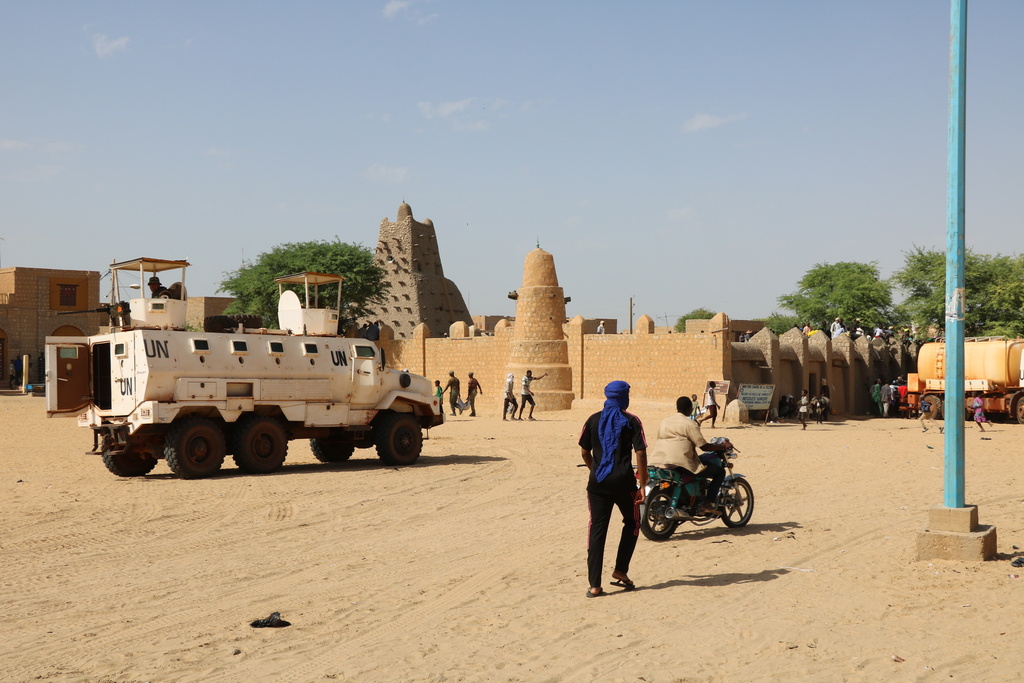Islamic State, al-Qaida Groups Grow in Sahel’s Security Vacuum
ADF STAFF
One violent extremist group has nearly doubled the territory it controls in Mali after the ruling junta severed ties with international peacekeepers and empowered brutal Russian mercenaries.
The ramifications are roiling northern Mali, where problems began 11 years ago with an Islamist revolt and continue to proliferate in neighboring Burkina Faso to the south. In that country, militants have dominated the north, east and west since a coup removed the civilian government in 2022.
Two groups are responsible for most of the violence: the Islamic State of the Greater Sahara (ISGS) and Jama’at Nusrat al-Islam wal-Muslimin (JNIM). In northern Mali, ISGS has been able to nearly double the territory it controls in less than a year, according to a 104-page report by U.N. experts circulated in August.
As ISGS continues to attack civilians in the region, it has made those who signed a 2015 peace agreement, including the Malian government, the Coordination of Azawad Movements and the Platform of the Movement of June 14, 2014, appear weak and unable to guarantee security.
JNIM has capitalized on this chaos and “is now positioning itself as the sole actor capable of protecting populations against Islamic State in the Greater Sahara,” the U.N. report states. Thus, groups that signed the agreement now rely on JNIM to gain credibility in their communities.
The result is an ever-increasing number of attacks by both groups in Burkina Faso and Mali. Africa Center for Strategic Studies (ACSS) statistics show that attacks have grown steadily since 2014 and now are spreading beyond the borders of the two countries.
Attacks from the two groups are crossing borders into Mauritania in the case of JNIM and al-Qaida affiliates, and into Niger in the case of ISGS and its affiliates. Both main groups now threaten the northern regions of coastal states Benin, Côte d’Ivoire, Ghana and Togo, according to the ACSS.
Two conditions can be counted among the reasons for the surge in violence. First, two successive coups led to Mali severing ties with international forces such as the French government and a United Nations’ peacekeeping mission, known as MINUSMA. Second, soon after the ruling junta solidified its rule in Mali, it welcomed mercenary forces from Russia’s Wagner Group.
More than 20,000 international forces were on the ground in Mali in 2020, according to the ACSS. That included MINUSMA, European Union forces, French personnel and G5 Sahel forces. By the end of 2023, those levels will be just above 12,000 — a 43% decrease. MINUSMA was set to withdraw completely by December 31 at the Malian junta’s demand. The force had reached 25% of that goal at the end of August, according to the U.N.
As that security presence steadily declined in Mali, violence increased in direct proportion to it. In February 2020, just as Wagner associates began a disinformation campaign against French and MINUSMA forces, violent events linked to militant groups and Wagner abuses were close to 300, according the ACSS.
Acts of violence increased by 97% in 2022 over 2020. Annual deaths connected to the violence more than doubled in 2022, and civilians “have borne the brunt of this violence,” the ACSS said in a February 2023 report. “There were more civilians killed in Mali in every quarter of 2022 than in any previous calendar year. Fatalities associated with violence against civilians are seven times higher in 2022 than in 2021.”
Wagner’s presence also has failed to improve Mali’s security landscape. In fact, it has made conditions worse.
“The lack of military capacity and ability to target jihadis from the air has seen the Wagner Group defaulting to the sort of heavy-handed tactics that it has used in other conflict zones,” the Combating Terrorism Center at West Point wrote in a 2022 report. “Not only does the Wagner Group have no regard for civilian casualties, but it appears to have repeatedly and deliberately targeted civilians in jihadi strongholds to deter the jihadis from launching attacks and to coerce the local population to turn against the jihadis living within their midst.”
The continuing lack of security was underscored on September 7 when JNIM extremists attacked a triple-decker Niger River passenger ferry near Timbuktu and a military installation in Bamba in Gao. In all, the attacks killed 49 civilians and 15 government soldiers, according to media reports.


Comments are closed.